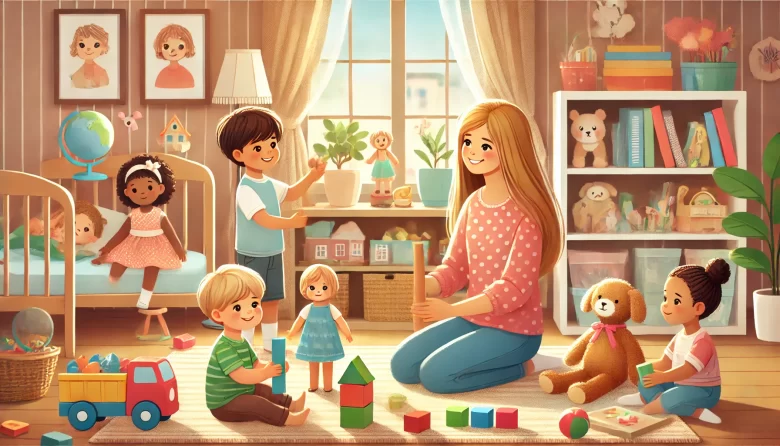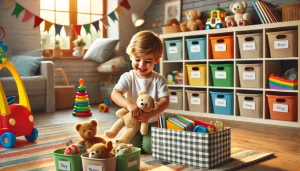Play is often seen as a fun activity, but for children, it’s so much more than that—it’s a vital part of their emotional and social development. Through play, children learn to navigate their feelings, build relationships, and understand the world around them. Whether it’s through imaginative play, structured games, or social interactions with peers, play helps children develop key emotional skills that will last a lifetime.
In this article, we’ll explore the role of play in emotional development and discuss how parents can encourage positive, developmentally appropriate play activities at home.
Why Is Play Important for Emotional Development?
Emotional development refers to the ability to recognize, understand, and manage emotions in oneself and others. Play helps children build these skills in several key ways:
Improves Emotional Expression
Through play, children can express emotions that may be difficult to articulate. For example, a child playing pretend games might act out feelings of frustration or excitement, helping them process their own emotions.
Fosters Empathy and Social Skills
When children play with others, they learn about cooperation, sharing, and understanding others’ feelings. These social interactions teach empathy, allowing children to understand different perspectives and form positive relationships.
Encourages Problem-Solving and Emotional Regulation
When playing games or engaging in activities, children often encounter obstacles or challenges. This encourages them to practice self-regulation, patience, and resilience. They also learn to cope with feelings of disappointment when things don’t go their way, developing emotional resilience.
Provides a Safe Space for Emotional Exploration
Play offers a safe and non-threatening environment for children to explore complex emotions such as anger, sadness, and joy. By enacting different scenarios in pretend play, children can understand and process these emotions in a healthy way.
How Play Helps with Key Emotional Skills
Emotion Recognition
Play often involves various characters, each with their own emotions. For instance, playing “doctor” may involve a child acting as the caregiver for a doll that is “feeling sick.” This type of role play helps children learn to recognize and label emotions by associating certain behaviors or situations with specific feelings.
Managing Emotions
When children play games, they often experience moments of frustration, excitement, or disappointment. These experiences provide opportunities to practice emotional regulation. For example, a child playing a board game may get upset when they lose, but through the game, they learn to manage disappointment, wait their turn, and enjoy the process rather than focusing on the outcome.
Social Interaction and Communication
Interactive play with others helps children develop important social skills such as:
- Taking turns
- Listening to others
- Expressing themselves clearly
- Negotiating and compromising
These skills are crucial for building positive relationships and navigating complex social situations.
Building Confidence and Self-Esteem
When children play, especially in role-playing activities, they experiment with different roles and scenarios. This fosters creativity, boosts self-confidence, and allows them to feel more capable in real-life situations. Pretending to be a superhero, a teacher, or a parent helps children gain confidence in their abilities.
Types of Play That Promote Emotional Development
Pretend Play (Imaginative Play)
Pretend play is one of the most powerful forms of play for emotional development. It allows children to act out real-life scenarios and emotions, from playing house to pretending to be doctors or animals. Through imaginative play, children learn to explore and express complex emotions while also developing problem-solving skills.
- Examples: Playing with dolls, pretending to be a teacher, playing “store,” creating imaginary characters.
Cooperative Play
Cooperative play involves children working together toward a common goal, such as building something with blocks or playing team-based games. This type of play is essential for developing social skills like sharing, communication, and teamwork.
- Examples: Playing board games, team sports, or cooperative building activities (e.g., building a fort or a tower).
Physical Play
Physical activities, such as running, jumping, climbing, or dancing, help children release energy and cope with feelings of frustration or stress. Physical play also teaches children how to control their bodies and be aware of their surroundings, which contributes to emotional regulation.
- Examples: Running, dancing, playing tag, climbing on playground equipment.
Structured Play (Games with Rules)
Structured play helps children understand boundaries, self-control, and respect for rules. Games with rules provide opportunities for children to practice emotional regulation when they feel competitive or disappointed.
- Examples: Board games, card games, sports with rules (e.g., soccer, tag).
Creative Play
Engaging in creative activities like drawing, painting, or crafting allows children to express their feelings through art. Creative play also promotes problem-solving and self-expression, which are key for emotional development.
- Examples: Drawing pictures to represent emotions, making crafts, creating music or stories.
How Parents Can Encourage Play for Emotional Development
Create a Play-Friendly Environment
Set up spaces where your child can engage in various types of play, whether it’s a playroom with toys and games or a safe outdoor space for physical activity. The more opportunities you provide for play, the more your child can develop emotionally.
Be Involved in Play
Join your child in their play activities. Participate in their pretend games, play board games together, or do creative activities side by side. Your involvement shows that play is valuable and helps you bond with your child while reinforcing positive emotional skills.
Provide Time for Unstructured Play
While structured activities are important, unstructured play (like free play with no set rules) is just as beneficial. Allow your child to explore their imagination and create their own games, which fosters creativity and independence.
Use Play to Discuss Emotions
After a play session, engage your child in conversations about the emotions they experienced during the activity. For example, after playing a game where someone lost, you could ask:
- “How did it feel when you lost the game?”
- “What did you do when you were frustrated?”
- “How can we make sure everyone feels happy when we play?”
These discussions encourage emotional awareness and help children process their feelings.
Encourage Play with Peers
Facilitate opportunities for your child to play with friends or siblings. Social play is essential for learning how to interact with others and manage emotions in group settings. Help guide them through social challenges, such as sharing, taking turns, and negotiating.
Final Thoughts
Play is not just a fun way for children to pass the time—it is a vital part of their emotional development. By engaging in different forms of play, children learn essential skills like empathy, problem-solving, and emotional regulation. As parents and caregivers, you can encourage these emotional growth opportunities by creating a play-rich environment, participating in activities, and guiding your child through their emotions.
By fostering a love for play and providing the right opportunities for social and emotional growth, you equip your child with the tools they need to navigate life’s challenges and develop strong, healthy relationships.




